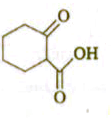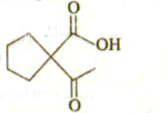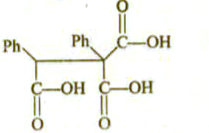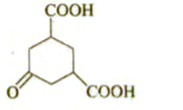Which of the following is decomposed on heating?
Na2CO3
MgCO3
K2CO3
Pb2CO3
The correct Answer is:B
To determine which of the given compounds decomposes upon heating, we will analyze each option based on their thermal stability.
1. Identify the Compounds: The question provides four compounds. Let's denote them as:
- Option A: Na2CO3 (Sodium Carbonate)
- Option B: K2CO3 (Potassium Carbonate)
- Option C: PbCO3 (Lead Carbonate)
- Option D: MgCO3 (Magnesium Carbonate)
2. Analyze Na2CO3:
- Sodium carbonate (Na2CO3) is derived from sodium hydroxide (NaOH), which is a strong base.
- Sodium carbonate is thermally stable and does not decompose upon heating.
3. Analyze K2CO3:
- Potassium carbonate (K2CO3) is derived from potassium hydroxide (KOH), which is also a strong base.
- Similar to sodium carbonate, potassium carbonate is thermally stable and does not decompose upon heating.
4. Analyze PbCO3:
- Lead carbonate (PbCO3) is known to decompose upon heating. It breaks down into lead oxide (PbO) and carbon dioxide (CO2).
- However, we need to check the last option to confirm.
5. Analyze MgCO3:
- Magnesium carbonate (MgCO3) is thermally unstable. When heated, it decomposes into magnesium oxide (MgO) and carbon dioxide (CO2).
- Therefore, MgCO3 does decompose upon heating.
6. Conclusion:
- Among the options, both PbCO3 and MgCO3 decompose upon heating. However, since the question asks for one compound, MgCO3 is a well-known example of a compound that decomposes upon heating.
Final Answer:
The compound that decomposes upon heating is MgCO3 (Magnesium Carbonate).
---
- Option A: Na2CO3 (Sodium Carbonate)
- Option B: K2CO3 (Potassium Carbonate)
- Option C: PbCO3 (Lead Carbonate)
- Option D: MgCO3 (Magnesium Carbonate)
- Sodium carbonate (Na2CO3) is derived from sodium hydroxide (NaOH), which is a strong base.
- Sodium carbonate is thermally stable and does not decompose upon heating.
- Potassium carbonate (K2CO3) is derived from potassium hydroxide (KOH), which is also a strong base.
- Similar to sodium carbonate, potassium carbonate is thermally stable and does not decompose upon heating.
- Lead carbonate (PbCO3) is known to decompose upon heating. It breaks down into lead oxide (PbO) and carbon dioxide (CO2).
- However, we need to check the last option to confirm.
- Magnesium carbonate (MgCO3) is thermally unstable. When heated, it decomposes into magnesium oxide (MgO) and carbon dioxide (CO2).
- Therefore, MgCO3 does decompose upon heating.
- Among the options, both PbCO3 and MgCO3 decompose upon heating. However, since the question asks for one compound, MgCO3 is a well-known example of a compound that decomposes upon heating.
The compound that decomposes upon heating is MgCO3 (Magnesium Carbonate).
Topper's Solved these Questions
- S-BLOCK GROUP 2 - ALKALINE EARTH METALSBOOK - CENGAGE CHEMISTRY ENGLISHCHAPTER - S-BLOCK GROUP 2 - ALKALINE EARTH METALSEXERCISE - Exercises Assertion Reasoning
17 Videos
- S-BLOCK GROUP 2 - ALKALINE EARTH METALSBOOK - CENGAGE CHEMISTRY ENGLISHCHAPTER - S-BLOCK GROUP 2 - ALKALINE EARTH METALSEXERCISE - Exercises Integer
6 Videos
- S-BLOCK GROUP 2 - ALKALINE EARTH METALSBOOK - CENGAGE CHEMISTRY ENGLISHCHAPTER - S-BLOCK GROUP 2 - ALKALINE EARTH METALSEXERCISE - Exercises Multiple Correct
25 Videos
- S-BLOCK GROUP 1 - ALKALI METALSBOOK - CENGAGE CHEMISTRY ENGLISHCHAPTER - S-BLOCK GROUP 1 - ALKALI METALSEXERCISE - Archives Subjective
8 Videos
- SOME BASIC CONCEPTS AND MOLE CONCEPTBOOK - CENGAGE CHEMISTRY ENGLISHCHAPTER - SOME BASIC CONCEPTS AND MOLE CONCEPTEXERCISE - Archives Subjective
11 Videos
Similar Questions
Knowledge Check
Which of the following decarboxylate on heating?
A B
B C
C D
D
Which of the following compounds decompose on heating ?
View SolutionWhich of the following compounds decompose on heating ?
View SolutionWhich decomposes on heating-
View SolutionWhich decomposes on heating-
View Solution(i). Which of the following oxides is reduced by hydrogen?
MgO,CuO and Na2O
(ii). Which of the following oxides will decompose on heating ?
ZnO, CuO, MgO, and Ag2O
(iii). The value of E∘OX for electrode reaction.
Fe→Fe2++2e− Cu→Cu2+2e− and Zn→Zn2++2e−
are 0.444, −0.337 and 0763 volt respectively. State which of these metals can replace the orther two from the solution of their salts?
View SolutionWhich of the following give no residue on heating?
View SolutionWhich of the following decomposes at highest temperature?
View Solution
